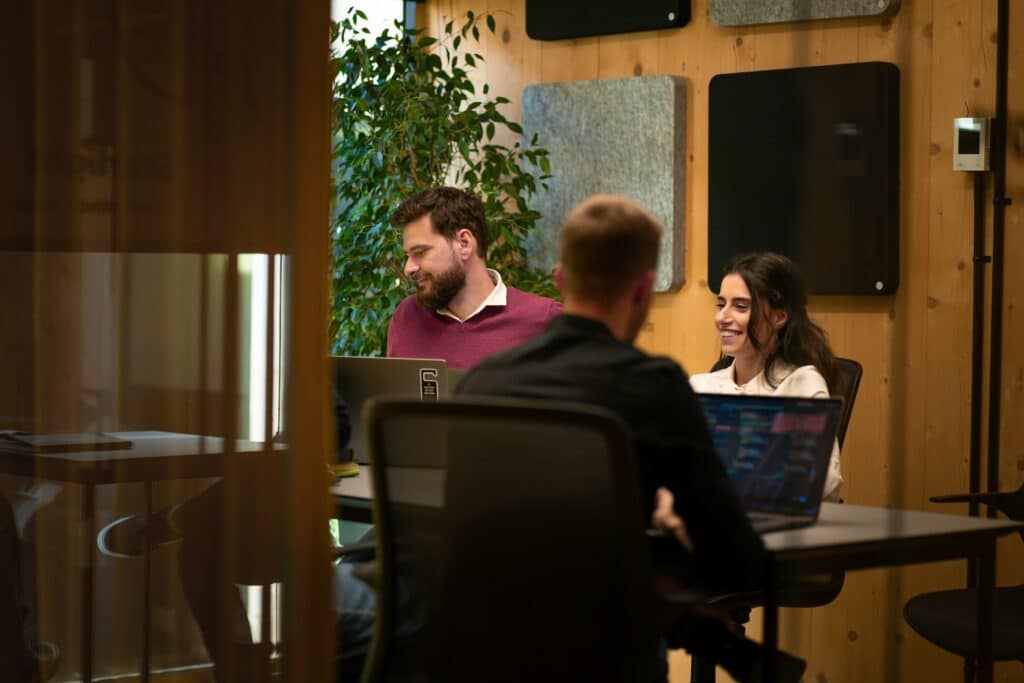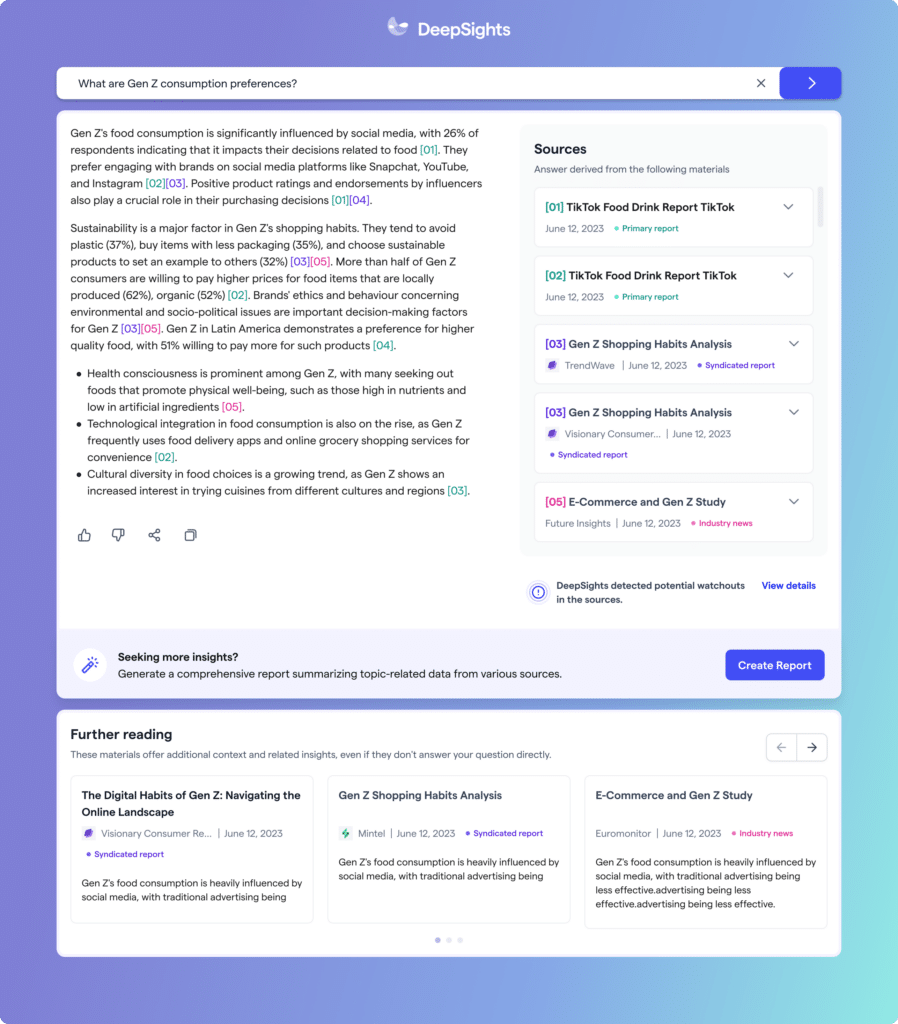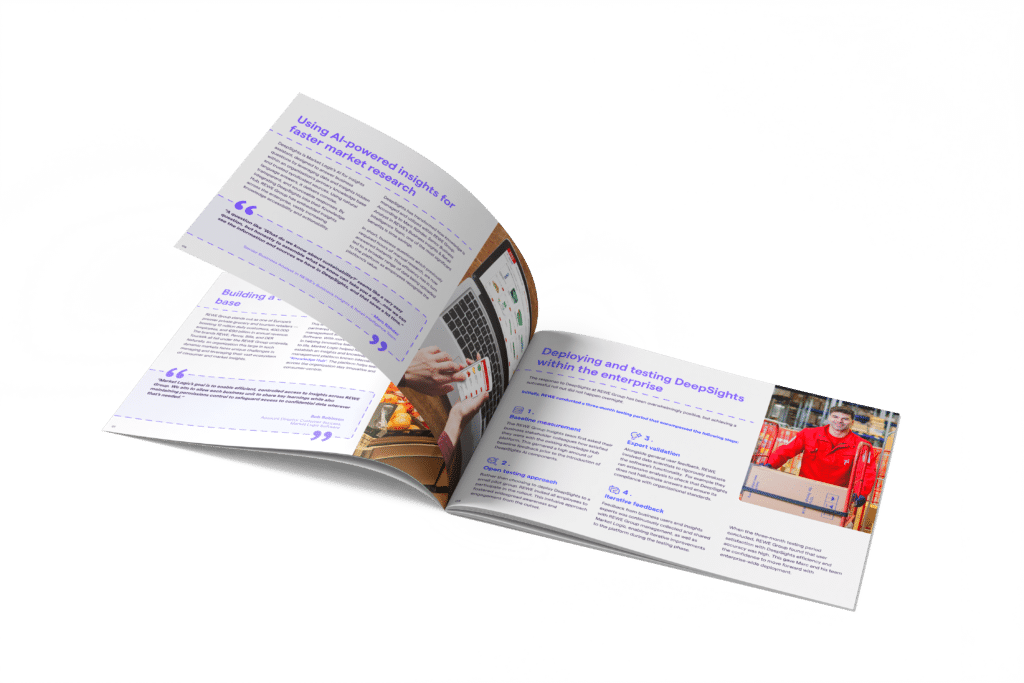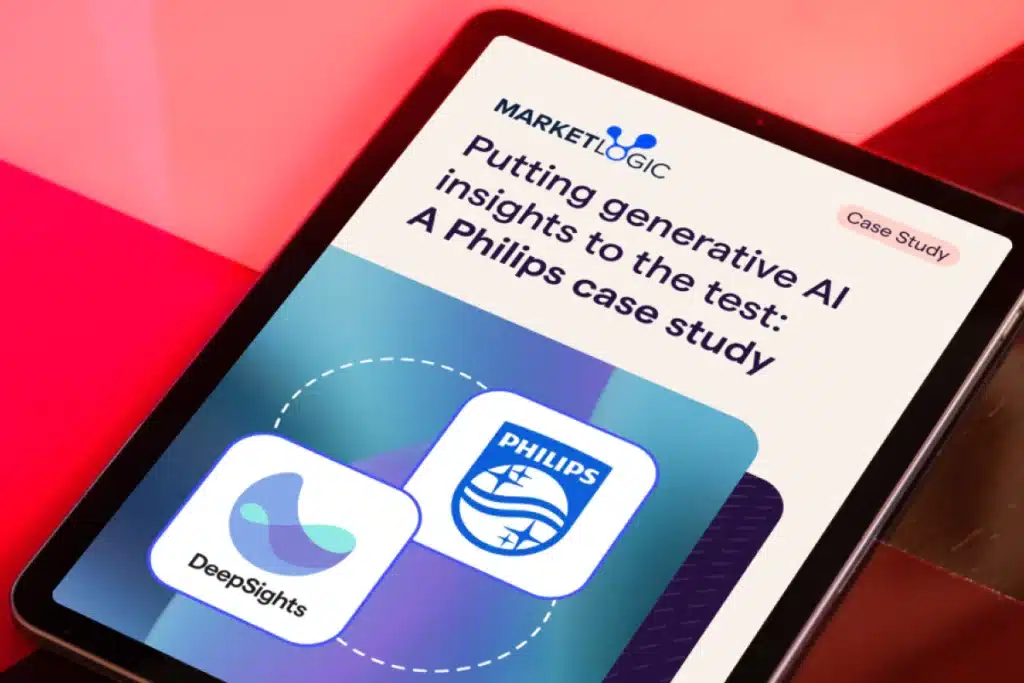Large enterprises commonly struggle with fragmented knowledge across departments and teams, often due to the sheer volume of information and its distribution across disparate locations. This fragmentation often prevents organizations from fully leveraging their collective information assets, which hinders strategic decision-making. Therefore, a unified knowledge-sharing culture is essential to overcome this challenge and maintain organizational success — which is something that AI can not only facilitate, but enhance.
The transformative capabilities of AI are already evident in knowledge management, particularly with AI-driven search and insights generation across vast market research, drastically reducing manual research time. Beyond these efficiencies, AI empowers teams to synthesize and share knowledge more effectively within a collaborative environment. The right AI technology can significantly optimize the discovery and delivery of relevant market research, ensuring every team member can access and contribute to the organization’s collective intelligence.

In this article, we’ll explore the common barriers to effective knowledge-sharing, and how AI, particularly through platforms like DeepSights™, can overcome these barriers to build a sustainable knowledge-sharing culture.
Understanding the barriers to knowledge sharing
Identifying the primary obstacles preventing effective knowledge sharing is crucial before implementing solutions. These barriers often reinforce one another, creating complex challenges that become more difficult to overcome.
The common barriers to knowledge sharing include:
Siloed data and information
Information silos significantly impede effective knowledge sharing. When critical market research data and insights remain isolated between departments or teams, organizations cannot fully leverage their collective knowledge.
These silos arise from departments using disparate systems, platforms, or methodologies for information storage, hindering a unified view and cross-functional collaboration.

Lack of accessible tools for knowledge discovery
Team members often struggle to find information quickly when search tools rely solely on keyword matches, ignoring query intent. This leads to time-consuming searches or the duplication of existing knowledge.
The absence of intuitive discovery tools frustrates users and encourages knowledge hoarding, hindering efficient market research.
Challenges in synthesizing and distributing insights
Extracting actionable insights from expansive market research demands significant time and expertise. Inefficient manual processes hinder cross-functional interpretation, including report generation and insights summarization.
Without systematic sharing across departments, critical insights remain isolated, ultimately causing bottlenecks and delaying informed decisions.
Lack of centralized knowledge repository
Maintaining consistency and accuracy across diverse market research sources is nearly impossible without a centralized repository. Accessing varied information versions leads to confusion and contradictory decisions, especially in strategic market planning. This fragmentation complicates new team member onboarding and misaligns efforts, resulting in duplicated work.
How AI breaks down barriers to knowledge sharing
AI breaks down these barriers by optimizing how organizations discover, synthesize, and distribute information. This unlocks the full potential of organizational knowledge, driving the strategic advantages of knowledge management.
Here are the details:
Automated insight distribution and filtering: AI automates the distribution of synthesized information by continuously filtering incoming information, identifying significant patterns and trends, and generating comprehensive summaries. This automation facilitates more efficient report generation and insight sharing, allowing team members to quickly access and apply insights.
AI-powered knowledge synthesis and summarization: Gen AI can analyze various market research reports, extracting key insights to create cohesive narratives in accessible formats. This capability makes information more accessible across all levels of expertise, democratizing organizational knowledge.
AI-driven search and discovery tools: Semantic search tools understand query intent, delivering relevant results even when terminology varies. AI enhances knowledge discovery by connecting seemingly unrelated sources, surfacing hidden insights.

Trusted insights platforms like DeepSights directly address the barriers to knowledge sharing by providing a centralized repository for diverse market research sources. DeepSights empowers large organizations with advanced AI-driven search and synthesis tools that enable the rapid discovery and distribution of insights. For instance, DeepSights Workspace facilitates project collaboration and document management, while its AI-powered search functionality ensures semantic understanding across all connected market research sources. This eliminates data silos and facilitates cross-departmental collaboration, fostering a more unified and informed knowledge-sharing culture.
Implementing AI-driven knowledge sharing
Creating a knowledge-sharing culture requires more than just implementing new technologies. Organizations need strategic approaches to integrate AI tools into existing workflows and encourage adoption across all levels. DeepSights offers specific capabilities that address the core requirements for effective knowledge management and sharing.
When it comes to building a knowledge-sharing culture powered by AI technology, this is what’s needed and how DeepSights makes it possible:

Centralized insights platform
To eliminate information silos, organizations must establish a single source of truth for market research and internal knowledge.
DeepSights enables comprehensive knowledge consolidation through its Workspace features, fostering project collaboration and a centralized repository for all relevant data. This ensures consistent access to accurate information and reduces research duplication. DeepSights’ AI search capabilities facilitate semantic search across multiple data sources, enabling rapid retrieval of specific information, regardless of location. This integrated approach breaks down departmental barriers and streamlines knowledge management.
For instance, Belgium’s largest ICT provider Proximus, utilized an AI-powered insights platform to evolve beyond basic data storage, actively promoting knowledge sharing. AI-driven search and multilingual capabilities allowed employees to access and share critical information across departments and language barriers. This facilitated faster, more informed decisions, showcasing AI’s role in cultivating a collaborative knowledge-sharing culture.
AI-powered search and discovery
Effective knowledge sharing requires intuitive tools that streamline information discovery — beyond basic keyword matching.
DeepSights’ AI-powered search enhances the user experience through semantic search, identifying relationships between disparate research for more relevant results. Users can create AI-generated summaries and search across all connected data sources, facilitating rapid access to information.
The REWE Group recently leveraged AI-driven search to overcome the challenge of scattered market insights. By implementing a platform that understands context and relationships, they enabled their teams to quickly find relevant information across diverse data sets. This reduced search time, empowered faster decision-making, and significantly enhanced the utilization of existing knowledge, demonstrating the critical role of AI in overcoming barriers to effective knowledge sharing.

This intuitive approach reduces search time and promotes the utilization of existing knowledge, helping organizations overcome a critical barrier to effective knowledge sharing.
Automated knowledge synthesis
Organizations must also efficiently transform market intelligence into actionable insights at scale — without losing accessibility.
DeepSights automates report generation and enables AI-generated summaries, streamlining insight creation. This reduces manual effort in synthesizing market research from multiple sources and ensures consistent quality in knowledge outputs. By automating routine synthesis tasks, DeepSights frees experts to focus on applying insights. This automation fosters a culture where experts can readily share insights, driving continuous learning.
The global technology company Dyson exemplifies the power of automated synthesis in delivering timely, comprehensive insights. By implementing an insights platform that provided a “single source of truth,” Dyson enabled its teams to quickly access and synthesize diverse market data. The platform’s ability to deliver the “big picture at the right time” facilitated faster, more informed decision-making, demonstrating how automated synthesis empowers organizations to efficiently share and utilize critical knowledge.

Encouraging cross-departmental collaboration
Building a knowledge-sharing culture requires the active promotion of continuous learning and seamless collaboration across departments. This includes providing comprehensive training and resources for AI-powered tools.
DeepSights facilitates this by providing intuitive tools that streamline collaborative workflows. Specifically, DeepSights Workspace enables shared projects, document commenting, and change tracking, while its user-friendly interface and integrated communication tools foster efficient team collaboration and insight sharing.
The leading health technology company Phillips demonstrates the power of effective storytelling in driving cross-departmental collaboration. By implementing best practices for communicating insights, Philips ensured that market knowledge was not just stored, but actively shared and understood across the organization. This approach fostered a culture where insights were transformed into compelling narratives, promoting broader engagement and enabling teams to collaborate more effectively on data-driven decisions.

Building a knowledge-sharing culture: Key takeaways
AI-driven knowledge sharing optimizes information discovery, synthesis, and distribution, leading to improved organizational collaboration. To cultivate a dynamic knowledge-sharing culture, organizations must assess their current barriers, implement AI-driven tools, and develop strategies that encourage adoption through training and recognition.
DeepSights is an award-winning insights platform that’s essential for breaking down information silos and enabling efficient knowledge-sharing. By automating routine tasks and providing intuitive search and synthesis tools, DeepSights allows organizations to accelerate innovation and make informed strategic decisions based on shared insights. Experience how DeepSights can improve your organization’s knowledge-sharing practices by requesting a personalized demo today.








